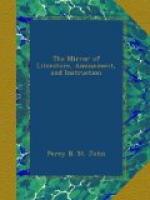296. Interior of a Gaming-house. H. Pidding. We take this to represent one of the salons of Frescati’s, or other Parisian gaming-house, where females are admitted to participate in the game, and witness the madness and folly of the stronger sex. The party are chiefly about a rouge et noir table, and are in the highest stage of recklessness. One of them, a female, has flung herself from the lure across a chair, apparently in the last stage of wretchedness and despair. The excitement of the players is powerfully wrought up and contrasted with the sang froid of the croupier, who seems to treat all the world as a ball. Other persons are seeking fresh excitement at the hands of a liveried waiter. But we must leave the rest, which it would take a column or two to describe, especially as to our mind, a gaming-house furnishes an epitome of all the bad passions that rankle in the human breast.
301. The Reform Question. Thomas Clater. A pleasanter scene than the preceding picture. A village blacksmith is reading the newspaper, by a candle held by a boy, to a listening neighbour. The puzzling of the reader, the vacant stare of the candle-holder, and the intent expression of the absorbed listener, are excellent. Perhaps the light of the candle is objectionable.
311. Love in the Dairy. H.H. Hobday. A ticklish village amour: a young fellow importuning a buxom dairy-maid, and apparently on the verge of conquest; in the distant door-way stands a mar-loving, wrinkled old woman, whose crabbed face ought not to be trusted in a dairy.
466. The Lord Chancellor, seated in a chair, in his official robes, by J. Lonsdale. The likeness is excellent, as are the robes, wig, ruffles, &c. but the great seal and mace are even dingier than the orignals. We could have spared the books thrown on the floor, though the paper register in one of them almost comes out.
We reserve a few pictures for another visit. The Portraits, as might be expected, are numerous. The King’s supporters are two ex-sheriffs: by the way, how many good turns does office yield to art; there is nothing like a portrait to perpetuate your brief authority. Works of imagination are scarce, especially as empainting the ideas of poets and passion-writers has become fashionable.
* * * * *
NOTES OF A READER.
THE VEGETABLE WORLD.
We pencil a few passages, at random, from Part 14 of Knowledge for the People—(Botany, concluded.)
Why does snow, when in contact with leaves and stems, melt more speedily than when lodged upon dead substances?
Because of the internal heat of the plants, heat being a production of the vegetable as well as animal body, though in a much lower degree in the former than the latter. Mr. Hunter appears to have detected this heat by a thermometer applied in frosty weather to the internal parts of vegetables newly opened. It is evident that a certain appropriate portion of heat is a necessary stimulus to the constitution of every plant, without which its living principle is destroyed.—Smith.




